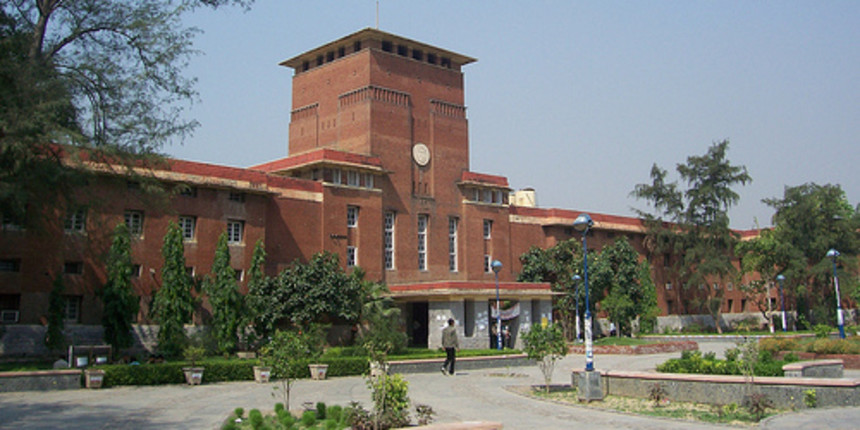Delhi University drops Pakistan’s national poet from syllabus; passes teacher education programme
Atul Krishna | May 27, 2023 | 01:09 PM IST | 3 mins read
A teachers’ group also opposed the Partition Studies centre saying the decision to start it is “offensive, communally divisive and intellectually incoherent”
Colleges/Universites Accepting CUET Score
Download list of Colleges/ Universities Accpeting CUET/CUCET Score with Cut-OFFs
Download Now
NEW DELHI: The Delhi University Academic Council on Friday, passed a resolution to drop Pakistan’s national poet Muhammad Iqbal from the political science syllabus. Delhi University vice-chancellor Yogesh Singh, in the meeting, commented that “those who laid the foundation to break India should not be in the syllabus”.
Latest: Check DU PG Seat Allotment 2025 | Vacant Seats for Spot Round 4
DU PG Spot Round 2025: First Cutoff | Second Cutoff | Third Cutoff
DU PG 2025: Third Cutoff | Second Cutoff | First Cutoff
Don't Miss: NIRF DU Colleges Ranking
The vice-chancellor said that Iqbal wrote songs “supporting the Muslim League” and the Pakistan Movement and that Iqbal was the first to raise the idea of partition of India and establishment of Pakistan. Muhammad Iqbal is also known for writing the famous song ‘Sare Jahan se Acha’.
The DU Academic Council also passed the introduction of three new BTech programmes by the Faculty of Technology from the academic session 2023-2024. It will launch BTech Computer Science and Engineering, BTech Electronics and Communication Engineering and BTech Electrical Engineering.
The council also passed resolutions to form the Centre for Independence and Partition Studies, Centre for Tribal Studies, and the new Integrated Teacher Education Programme (ITEP) amid dissents from members.
The resolutions will now be presented before the Executive Council meeting on June 9.
DU centre ‘communally divisive’
Several teachers and Academic Council (AC) members had alleged that the new ITEP is an “academically unclear” programme that will replace the competent and well-established Bachelor of Elementary Education (B.El.Ed). However, DU vice chancellor said that the ITEP “will not have any impact on existing teacher programmes” and that “no programmes will be closed”.
Several AC members, in a dissent note presented in the council, said that the university did not consult any teachers of the affected colleges before introducing the ITEP before the council. They also said that the new programme “dilutes the faculty qualification” of the teaching programmes.
Also Read| University of Hyderabad notifies 76 reserved teaching posts after NCBC warning
AC members also called the university’s decision to introduce the new Centre for Independence and Partition Studies as “offensive, communally divisive and intellectually incoherent”. They said that the centre’s objective to “study and research the invasions, and consequent sufferings of slavery that occurred in the past 1,300 years” is a “political argument” that has been refuted by historians and political scientists. It said that the discussion being limited to the past 1,300 years will only make way for “venomous communal speeches”.
They also called out the committee in charge of forming the new Centre for Tribal Studies as having a “colonial understanding” of a tribe. They said that the centre’s objective to study tribal leaders in various eras of India history is a “colonial stereotype” that portrays tribes as “trans-historical”.
Ad hoc teachers, suicide
Dissenting members called for the university to absorb ad-hoc teachers against the vacancies present at the university. Calling the suicide of a Hindu College professor an “institutional murder”, the members said that the university has made guest appointments a norm and instead of absorbing them, massive numbers of guest teachers are “displaced based on 3 minute interviews”.
The members also said that the scrapping of the Mphil course has left the university with fewer researchers and that the university should look to increase the number of PhD seats across departments.
They also called for an investigation into the social profile of students being admitted to DU following the introduction of Common University Entrance Test (CUET). Teachers said that there seems to be a “steep rise” in the number of upper middle class students in the university. They said that CUET has caused an expulsion of students from lower middle class due to their inability to afford CUET coaching.
Teachers argued that the academic restructuring that the DU introduced with the four year undergraduate programme has “compromised” students' learning. They said that with the introduction of the new Value Addition Course (VAC) and Skill Enhancement Course (SEC), there are three extra papers in the first semester has burdened students who are able to spend less time on the core courses and labs due to the schedule of the VACs and SECs.
Teachers also cited a student survey which said that more than 50 percent of core classes, VACs and SECs, were not happening regularly due to the tight schedule and lack of infrastructure in colleges.
Follow us for the latest education news on colleges and universities, admission, courses, exams, research, education policies, study abroad and more..
To get in touch, write to us at news@careers360.com.